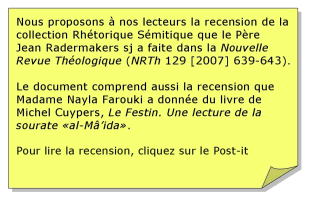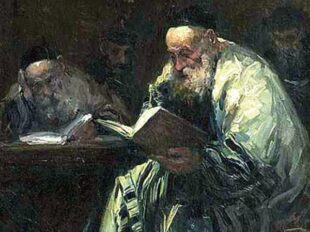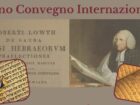Collection directed by Roland Meynet with Jacek Oniszczuk.
Many imagine that classical rhetoric, inherited from the Greeks through the Romans, is universal. It is indeed the one that seems to govern modern culture, which the West has spread over the whole planet. The time has now come to abandon such ethnocentrism: classical rhetoric is not alone in the world.
The Hebrew Bible, whose texts were written mainly in Hebrew but also in Aramaic, obeys a rhetoric that is quite different from Greco-Roman rhetoric. It must therefore be recognized that there is another rhetoric, the “Hebrew rhetoric”.
As for the other biblical texts, of the Old Testament and the New, which were either translated or written directly in Greek, they largely obey the same laws. We are therefore entitled to speak not only of Hebrew rhetoric, but more broadly of “biblical rhetoric”.
Moreover, these same laws were then recognized at work in Akkadian, Ugaritic and other texts, upstream of the Hebrew Bible, and then in the Arabic texts of the Muslim Tradition and the Koran, downstream of the biblical literature. It must therefore be admitted that this rhetoric is not only biblical, and we shall say that all these texts which belong, in different ways, to the same cultural area, belong to the same rhetoric which we shall call “Semitic rhetoric”.
Contrary to the impression that the Western reader inevitably gets, the texts of the Semitic tradition are very well composed, provided, of course, that they are analyzed according to the laws of the rhetoric to which they belong. We know that the form of the text, its layout, is the main gateway to meaning. Not that the composition provides, directly and automatically, the meaning. However, when the formal analysis allows to operate a reasoned division of the text, to define in a more objective way its context, to put in evidence the organization of the work at the various levels of its architecture, are thus united the conditions which allow to undertake, on less subjective and fragmentary bases, the work of interpretation.
- Roland Meynet, L’évangile de Marc, RhSem 16, Gabalda, Pendé 2014 (598 p.) Copia
- Michel Cuypers, Une apocalypse coranique. Lecture des trente-trois dernières sourates du Coran, RhSem 15, Gabalda, Pendé 2014 (364 p)
- Roland Meynet, La Pâque du Seigneur. Passion et résurrection de Jésus dans les évangiles synoptiques, RhSem 14, Gabalda, Pendé 2013 (517 p.)
- Roland Meynet, La Pâque du Seigneur. Passion et résurrection de Jésus dans les évangiles synoptiques, RhSem 14, Gabalda, Pendé 2013 (517 p.) Copia
- Roland Meynet, La Pâque du Seigneur. Passion et résurrection de Jésus dans les évangiles synoptiques, RhSem 14, Gabalda, Pendé 2013 (517 p.)
- Jacek Oniszczuk, La première lettre de Jean, RhSem 13, Gabalda, Pendé 2013 (309 p.)
- Roland Meynet – J. Oniszczuk, Exercices d’analyse rhétorique, RhSem 12, Gabalda, Pendé 2013 (358 p.)
- Roland Meynet, Traité de rhétorique biblique. Deuxième édition revue et corrigée, RhSem 11, Gabalda, Pendé 2011 (715 p.)
- Roland Meynet, La Lettre aux Galates, RhSem 10, Gabalda, Pendé 2012 (255 p.)
- Roland Meynet, La Lettre aux Galates, RhSem 10, Gabalda, Pendé 2012 (255 p.)
- Michel Cuypers, La Composition du Coran, RhSem 9, Gabalda, Pendé 2012 (299 p.)
- Roland Meynet, L’Évangile de Luc, RhSem 8, Gabalda, Pendé 2011 (1045 p.)
- Albert Vanhoye, L’Épître aux Hébreux. «Un prêtre différent», RhSem 7, Gabalda, Pendé 2010 (348 p.)
- Roland Meynet, Une nouvelle introduction aux évangiles synoptiques, RhSem 6, Lethielleux, Paris 2009 (380 p.) Copia
- Roland Meynet, Appelés à la liberté, RhSem 5, Lethielleux, Paris 2008 (237 p.)
- Roland Meynet, Traité de rhétorique biblique, RhSem 4, Lethielleux, Paris 2007 (717 p.).
- Michel Cuypers, Le Festin. Une lecture de la sourate Al-Mâ’ida, RhSem 3, Lethielleux, Paris 2007 (453 p.).
- Tomasz Kot, La Lettre de Jacques. La foi, chemin de la vie, RhSem 2, Lethielleux, Paris 2006 (281 p.).
- Roland Meynet, L’Évangile de Luc, RhSem 1, Lethielleux, Paris 2005 (1040 p.) épuisé.
Ces livres sont publiés avec le soutien de l’Association Hervé Renaudin







